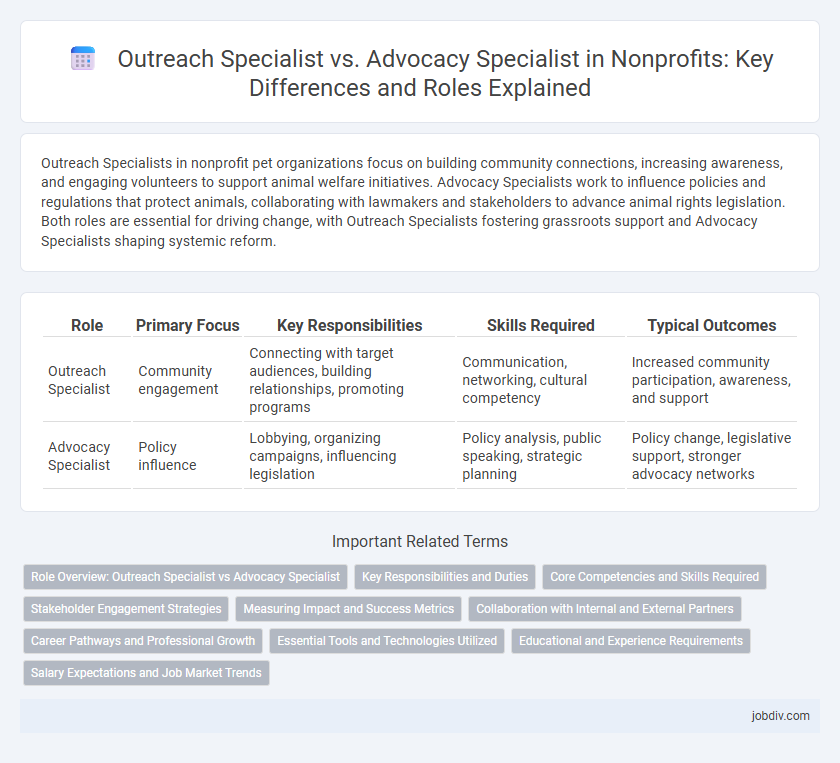Outreach Specialists in nonprofit pet organizations focus on building community connections, increasing awareness, and engaging volunteers to support animal welfare initiatives. Advocacy Specialists work to influence policies and regulations that protect animals, collaborating with lawmakers and stakeholders to advance animal rights legislation. Both roles are essential for driving change, with Outreach Specialists fostering grassroots support and Advocacy Specialists shaping systemic reform.
Table of Comparison
| Role | Primary Focus | Key Responsibilities | Skills Required | Typical Outcomes |
|---|---|---|---|---|
| Outreach Specialist | Community engagement | Connecting with target audiences, building relationships, promoting programs | Communication, networking, cultural competency | Increased community participation, awareness, and support |
| Advocacy Specialist | Policy influence | Lobbying, organizing campaigns, influencing legislation | Policy analysis, public speaking, strategic planning | Policy change, legislative support, stronger advocacy networks |
Role Overview: Outreach Specialist vs Advocacy Specialist
Outreach Specialists focus on building relationships and engaging community members through targeted communication strategies and program implementation to increase awareness and participation. Advocacy Specialists concentrate on influencing public policy and mobilizing stakeholders to support specific causes, utilizing research, lobbying, and public campaigns to create systemic change. Both roles require strong communication skills but differ in their primary objectives: community engagement versus policy influence.
Key Responsibilities and Duties
Outreach Specialists engage communities by organizing events, developing educational materials, and building partnerships to increase program participation and awareness. Advocacy Specialists focus on influencing public policy, conducting research, lobbying stakeholders, and mobilizing supporters to drive legislative or social change. Both roles require strong communication and relationship-building skills but differ primarily in their target goals: community engagement versus policy advocacy.
Core Competencies and Skills Required
Outreach Specialists excel in community engagement, communication, and relationship-building, leveraging skills in event coordination, social media management, and public speaking to expand nonprofit visibility and participation. Advocacy Specialists concentrate on policy analysis, strategic planning, and campaign management, requiring proficiency in legislative processes, public relations, and stakeholder mobilization to influence public policy and drive social change. Both roles demand strong interpersonal abilities, but Outreach Specialists prioritize grassroots connection while Advocacy Specialists focus on systemic impact and legislative advocacy.
Stakeholder Engagement Strategies
Outreach Specialists develop targeted communication campaigns to build relationships with diverse community groups, enhancing nonprofit visibility and volunteer recruitment. Advocacy Specialists craft policy-driven messaging to influence legislators and mobilize stakeholders around key social issues. Both roles prioritize stakeholder engagement by leveraging tailored strategies to foster commitment and amplify impact within their networks.
Measuring Impact and Success Metrics
Outreach Specialists measure impact through engagement metrics such as the number of individuals reached, event attendance, and community partnerships formed, focusing on broad-based participation growth. Advocacy Specialists track success by analyzing policy changes influenced, legislative wins, and shifts in public opinion related to targeted issues. Both roles rely on data-driven evaluation and qualitative feedback to refine strategies and demonstrate their nonprofit's social impact effectively.
Collaboration with Internal and External Partners
Outreach Specialists excel in building and maintaining relationships with community groups, donors, and volunteers, facilitating effective communication to expand nonprofit reach and engagement. Advocacy Specialists work closely with policy makers, coalition members, and legal experts to influence legislation and public policy aligned with the organization's mission. Both roles require strong collaboration skills, but Outreach Specialists focus on grassroots mobilization while Advocacy Specialists prioritize strategic alliances for policy impact.
Career Pathways and Professional Growth
Outreach Specialists in nonprofits focus on building community relationships and expanding program participation, which develops skills in communication, event coordination, and stakeholder engagement that can lead to roles in community management or program leadership. Advocacy Specialists concentrate on influencing public policy and raising awareness on social issues, honing expertise in lobbying, public relations, and strategic campaign planning that paves the way for careers in policy analysis, governmental affairs, or executive advocacy positions. Both career paths offer professional growth through specialized training, networking opportunities, and leadership development tailored to advancing nonprofit missions and social impact.
Essential Tools and Technologies Utilized
Outreach Specialists predominantly use customer relationship management (CRM) software, email marketing platforms, and social media analytics tools to engage and expand community networks effectively. Advocacy Specialists rely heavily on policy tracking software, data visualization tools, and digital petition platforms to influence legislation and mobilize public support. Both roles utilize communication technologies but prioritize different tools aligned with their core objectives within nonprofit organizations.
Educational and Experience Requirements
Outreach Specialists typically require a bachelor's degree in communications, social work, or a related field, with experience in community engagement and public relations to effectively connect with diverse populations. Advocacy Specialists often hold degrees in law, public policy, or social sciences, complemented by experience in lobbying, policy analysis, or grassroots organizing to influence legislation and public opinion. Both roles benefit from strong interpersonal skills, but Advocacy Specialists generally need more specialized knowledge of regulatory processes and advocacy strategies.
Salary Expectations and Job Market Trends
Outreach Specialists in the nonprofit sector typically earn between $45,000 and $60,000 annually, reflecting demand for community engagement and program promotion skills. Advocacy Specialists command slightly higher salaries, often ranging from $50,000 to $70,000, driven by expertise in policy influence and stakeholder communication. Current job market trends show growing opportunities for Advocacy Specialists due to increased emphasis on legislative impact, while Outreach Specialists remain crucial for grassroots mobilization and public awareness campaigns.
Outreach Specialist vs Advocacy Specialist Infographic

 jobdiv.com
jobdiv.com